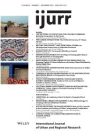Informal, or illegal, occupation of land is growing in importance in the cities of the developing world, especially sub‐Saharan Africa. The widespread nature of ‘illegality’ in some situations has led to queries of whether this should be termed ‘illegal’, and this is particularly so where there are potentially different entities bestowing legality. It has been increasingly recognized that informal land development is a solution for access to land by the urban poor, where formal supply is inadequate and inflexible, but that there need to be more efficient relationships between the formal and informal sectors. It is thus argued that new forms of association and new forms of partnership across the formal boundary are required. This article looks at the situation of land access for housing in Maputo, the capital of Mozambique, with a focus on the poor majority, and suggests alternative mechanisms for urban land rights to the simplistic application of full freehold tenure in formal land markets. These alternative mechanisms are based on structures within civil society, as it is argued that where the state and market are weak, as in Mozambique, these are more appropriate and less alienating for the urban poor majority.
Details
Written by:
Paul Jenkins
Digital Object Identifier (DOI)
10.1111/1468-2427.00333
About DOI
Read full article as PDF
Read full article as HTML
See the references for this article
